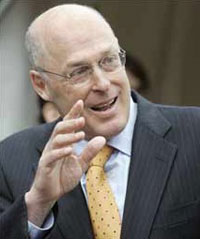US economy is healthy, inflation under control, US Treasury Secretary says
Treasury Secretary Henry Paulson says the economy is healthy, inflation seems under control and the U.S. should not perceive China as an economic enemy.

"Markets never move in any one direction forever in a straight line. And so I look at it and put it in perspective and say, over the last year, the Dow‘s up almost 11 percent, the S&P‘s (the Standard & Poor‘s 500 index) up 9 percent, and I‘ll take it," Paulson said.
The sell-off followed comments a day earlier by former Federal Reserve Chairman Alan Greenspan that the economy might slip into recession by year‘s end. Just weeks ago, the current chairman, Ben Bernanke, gave Congress a mostly upbeat assessment of the economy‘s prospects.
"You know, a year ago, when the growth rates were much higher, I was concerned. I said,
Is this going to be sustainable? Now I‘m looking at it and I‘m seeing a situation where it looks like we‘re successfully making the transition.
"We‘ve got a very healthy labor market. ... Inflation seems to be contained. And what really makes a difference to me is the average worker is now beginning to feel the benefits. Real income is up 2.1 percent for the average American worker over the last year. So I‘m feeling good about the U.S. economy."
"I would say that our relationship with China is multifaceted and it‘s a very important relationship for the U.S. And I don‘t believe we need to make China an enemy," Paulson said.
"And if we manage that relationship properly on a long-term basis, and if we manage the relationship — the overall relationship — with China properly, it‘s going to benefit both of our countries for a long time to come."
But the chairman of the tax-writing House Ways and Means Committee said Congress was ready to take a hard line against Beijing, localnewswatch.com reports.
"United States consumers are paying for the research and development that we have in intellectual property. And you steal from them, you are stealing from Americans," he said on "Fox News Sunday."
"Their whole economy is developing; their capital markets are not nearly as developed as their manufacturing economy. They‘re not reflective of the Chinese economy overall. They‘re largely cut off from the global capital markets," he said.
"But as they reform those capital markets and as they open them up to competition, this will make it possible for them to have a currency that trades in a competitive marketplace. This will help their economy develop in a way which it‘ll be good for them and good for us, because there will be a bigger market for our exports," Paulson said.
Paulson begins his four-day Asia visit in Tokyo on Monday.
U.S. Treasury officials said during his two days in Japan, the world's second-largest economy, Paulson would encourage Prime Minister Shinzo Abe and other top officials, including Finance Minister Koji Omi and Bank of Japan Governor Toshihiko Fukui, to do all they can to speed up growth.
Paulson said on Thursday that Japan and Europe need to "continue to pursue pro-growth economic and labor reforms" to create more demand for U.S. goods and a better balance trade.
U.S. Treasury officials say any Asian trip with China on the roster means "currency is an issue," and in this case Paulson may highlight the fact that Japan and South Korea have not been intervening to keep their currencies' values down.
The yen's value has risen during the recent global market turbulence as "carry trades," in which a currency in a low-interest-rate country like Japan is borrowed to invest in higher-yielding assets elsewhere.
From Tokyo, Paulson heads to the South Korean capital Seoul where he is scheduled to meet President Roh Moo-hyun on Wednesday, as well as Kwon O-kyu, the deputy prime minister and finance minister, Reuters reports.
Source: agencies
Prepared by Alexander Timoshik
Pravda.ru
Subscribe to Pravda.Ru Telegram channel, Facebook, RSS!




